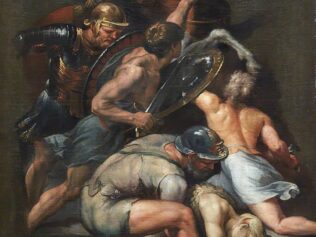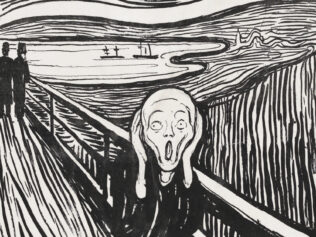
June in history according to an eternal pessimist.
1st June 4000 BCE
In what is now Ukraine, in Dereivka on the Dnieper River, the first horse was domesticated. The exact date and place are purely hypothetical, but nevertheless there are archaeological finds that support it, such as the oldest ever horse teeth found on the site, showing signs of wear and tear from the bridle. I wonder if the horses that pull tourists in carriages around New York’s Central Park nowadays would want to kick their ancestral ‘historical hero’ in the teeth…
2nd June 455
The Vandals spilled into Rome, plundering it for two weeks. These days, sightseeing doesn’t take quite as long.
3rd June 1948
Korczak Ziółkowski – a Polish-American sculptor – began to chisel away at the rock in the Black Hills of South Dakota to create a gigantic statue of the Indian chief Crazy Horse. It’s so huge that the artist died before he could to finish it. His work has been continued by others and is still underway. That’s what’s called generations working together.
4th June 1962
Lee Harvey Oswald returned from the USSR to America via the Netherlands. His ultimate destination was Dallas, where he would assassinate President Kennedy. Epilogue: Oswald himself would die at the hands of a ‘patriotic’ gangster.
5th June 1894
The Racławice Panorama, a large cycloramic painting depicting the battle between Russian and Polish troops under the command of Tadeusz Kosciuszko, is put on display in the city then known as Lwów (now Lviv in Ukraine). It may not be the greatest painting in the world, but it certainly is huge.
6th June 1980
The Jarocin Festival (Poland’s answer to Woodstock) was held for the very first time. Things got pretty loud – all over the country, despite the censorship.
7th June 1924
The mountaineer George Mallory nearly reached the summit of Mount Everest, when he suddenly disappeared. To this day, it is not known whether he was actually the first to reach the roof of the world, or just another unlucky failure.
8th June 1783
Volcano Laki erupted in Iceland. The eruption lasted several months and was not only devastating to Iceland, but also catastrophic for the rest of Europe. Clouds of ash and gas caused crop failure, reducing farmers to near poverty. Six years later this, in turn, would trigger the outbreak of the French Revolution.
9th June 1942
The Germans decided to change Hitler’s route through Pomerania. Too bad: the Polish resistance movement ended up derailing the wrong troop train. Many Nazi soldiers died, including two generals, but not the Führer himself.
10th June 1190
The Third Crusade. Instead of lying prostrate in worship or crossing swords with enemies, Holy Roman Emperor Frederick Barbarossa went for a swim in a river. And he well and truly ‘went’ – he did not get out of the water alive.
11th June 1770
Captain James Cook stumbled onto the Great Barrier Reef. His ship survived it somehow, and he himself was not impressed, but this discovery spelled the beginning of the end for the reef’s underwater inhabitants.
12th June 1968
Roman Polanski’s Rosemary’s Baby premiered. It’s difficult to count how many people associated with the production of the horror movie experienced real-life horrors afterwards. Even more scarily, many see this as the work of supernatural forces…
13th June 1325
The Islamic traveller Ibn Battuta set off from Tangier on a journey that would last almost a quarter of a century. Unlike Marco Polo, however, he never advertised his journey enough to gain worldwide fame. Which just goes to show that nothing beats good marketing.
14th June 1822
The mathematician Charles Babbage pitched the idea to the British Royal Astronomical Society of building a so-called differential machine, a kind of 19th-century computer. Unfortunately, he was way ahead of his time.
15th June 1219
The Danish flag literally fell out of the sky and landed at the Danes’ feet. At least that’s how the legend goes. In any case, the design stuck and the Danish flag inspired the flags of other Scandinavian countries. Now school children have trouble telling them all apart!
16th June 1792
With the Polish–Russian war underway, work was halted on the construction of the Warsaw Temple of Divine Providence – a syncretic symbol of gratitude for the Constitution of the Third of May (a short-lived experiment in democracy). The project would take well over 200 years to complete. The church would be erected in a different location in the city, and is now known as the Catholic Temple of Divine Providence.
17th June 1462
The ruler of Wallachia, Vlad the Impaler, delivered a night attack on the Turkish army, which caused much panic among the forces of the Sultan. They would have been even more panicked, had they knew that the bloody Impaler was the prototype of the diabolical Count Dracula.
18th June 1815
Napoleon lost the Battle of Waterloo. Many, however, claim that it was not his fault, but rather that of his staff officer: the Pole Jerzy Zenowicz! He was sent to bring backup for the emperor, but he took the long route and apparently did not pass on the order precisely. If he had done a better job, would he have been hailed as one of the heroes of the battle?
19th June 1269
The King of France, Saint Louis IX, ordered Jews to wear special yellow markings when in public. He wasn’t the first one to stigmatize them, as the Lateran Council had done so earlier in 1215. Regardless, none of this stopped him from becoming the only French king to be declared a saint…
20th June 1960
An animation, The Huckleberry Hound Show, received an Emmy award, the first time a children’s cartoon series ever received such an honour. Did this mean that there were no actors better than a cartoon dog? These days, animated films are often more interesting than feature films…
21st June 1941
Soviet archaeologists opened up the tomb of Tamerlane in Samarkand. They ignored the warning that disturbing the bloody conqueror’s eternal resting place would unleash a great war. So what happened? The next day Hitler attacked the USSR. The story of Tamerlane’s curse is still widely circulated online, although it is known that Hitler actually set the date of the attack back in December. Well, maybe he was in cahoots with Tamerlane?
22nd June 1789
Poland’s legislative body, the Sejm, ordered the first statistical census to be carried out in the Polish–Lithuanian Commonwealth. The plans were in vain, however, as by 1795 the country was wiped off the map, gobbled up by three partitioning powers (Russia, Prussia and Austria).
23rd June 1868
The inventor Christopher Latham Sholes patented a typewriter with the QWERTY keyboard layout. He would be surprised to hear that 150 years later, we are still using his very keyboard to write about him.
24th June 2010
In the longest match in tennis history, lasting 11 hours and 5 minutes, and played over three days with breaks, the American John Isner defeated the Frenchman Nicolas Mahut. Both men went down in history, but what about the stalwart fans who stayed with them through to the end?
25th June 1876
“Where did all these Indians come from?” shouted the frustrated General Custer during the Battle of the Little Bighorn. These would be his last words. At least according to the historical anecdote.
26th June 1945
In San Francisco, 50 countries signed the United Nations Charter. Poland was not one of them, because Comrade Stalin had not yet installed his own government in the country. Things did not improve later: Poland now takes part in debates at the UN, but rarely speaks with its own voice.
27th June 1697
The Polish nobility met to elect a new Polish king. Actually, they chose two: a Saxon and a Bourbon. This situation would prove to be quite a pickle for the country.
28th June 1880
In Australia, an outlaw ‘bushranger’, Ned Kelly, squared off against the British police wearing a set of homemade armour. He fared quite well until the officers started firing at his legs. Kelly would fall, lose his wit, and a few months later he was hung from the gallows.
29th June 1613
Shakespeare’s Globe Theatre burned down. Good thing it was just the building, which could be rebuilt. It would have been far worse if the Bard’s manuscripts had perished with it.
30th June 1990
Yugoslavia faced off against Argentina in the quarter finals of the World Cup. In the penalty shootout, Stojković from Serbia, Brnović from Montenegro and Hadžibegić from Bosnia all failed to score, and so Yugoslavia was out. If they had won, however, and reached the finals, maybe, at least for a moment, the increasingly divided country would have stood united. And maybe its downfall would not have been so violent.
Translated by Daniel J. Sax










